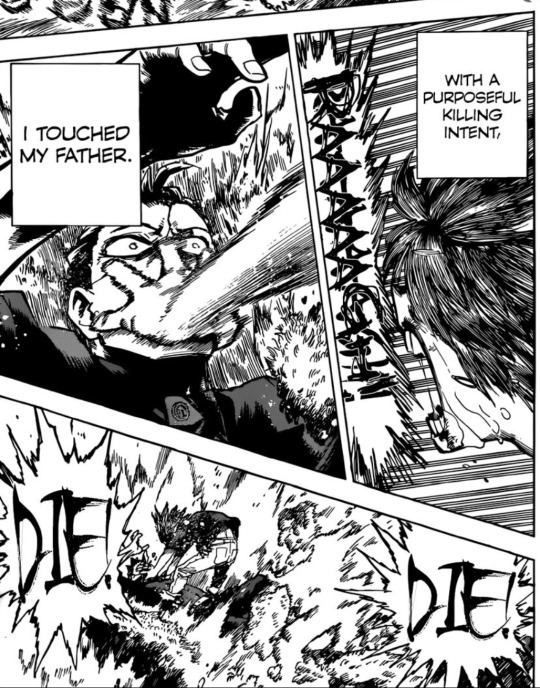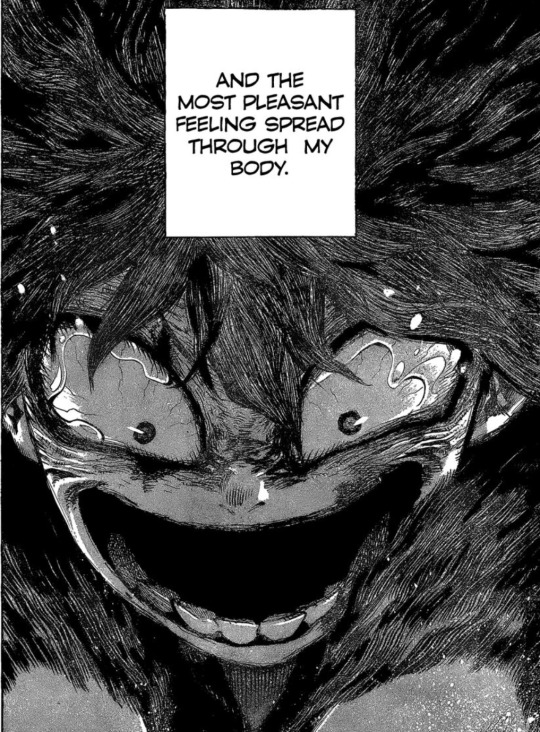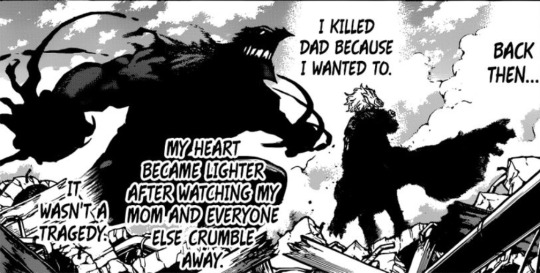#and we need to do that because we're intentionally using evil murder weapons that will drive us insane and kill us
Explore tagged Tumblr posts
Text
Extremely underrated scene in MDZS is when Nie Huaisang is like "Nono, you see, there's an extremely sensible reason why my family needs to have this tomb filled with cursed weapons and semi-zombified bodies in the walls!!" and then every single layer of the "explanation" is just progressively more insane.
#no see we NEED the semi-zombified corpses there to keep the evil weapons from going haywire#and we need to do that because we're intentionally using evil murder weapons that will drive us insane and kill us#yes we know they'll kill us. yes we intend to keep using them. what's not clicking.#anyway this whole cursed zombie tomb is actually a great safety measure that no one could have possibly predicted going wrong#it's somehow an improvement over our previous system of dealing with this#stop asking if we could just stop using evil murder sabers!! does BRANDING mean nothing to you goddamn
27 notes
·
View notes
Text
Sanism & Sequels: Psycho II
The Psycho franchise has a much more interesting relationship with sanism than its impact would lead you to believe. Despite relying on the “evil alter” trope, it is to some extent questioned within the story. Norman Bates is an intentionally sympathetic character, and even the reveal of him as the killer sparks a sympathetic response from Lila in the novel:
“And right now, I can't even hate Bates for what he did. He must have suffered more than any of us. In a way I can almost understand. We're all not quite as sane as we pretend to be.”
The movie does end without that explicit note so as to be more unsettling to the audience, but it also goes a long way to make Norman more palatable in the middle of the story, such as cutting down some of his more distasteful interests, bizarre delusions, and by casting him with Anthony Perkins, who was then often a romantic lead. The point is that “we all go a little mad sometimes.” Most of the original film also sits closer to a crime thriller than a proto-slasher, and that effect— to thrill the audience with what Norman can get away with, moreso than the actual murders— can be felt in the sequels despite the slasher genre being more set up then.
Psycho II plays with the sanism of the story by positioning Norman as a protagonist from the beginning. This creates a metanarrative tension— in order to hit the thrills of the now established slasher, Norman has to regress, which is directly counter to his desire as a sympathetic protagonist. Because he isn’t cleaning up the bodies here, the question is raised of if the murders are actually Norman, and as a result questions if a murderer must necessarily be insane, or if they are doing this to victimize an already vulnerable man.
That victimization is clearly at the forefront of the screenplay’s mind. Norman never draws a knife on anyone; his only acquiring of that weapon is for him and his friend’s protection during a paranoid episode, during which she has a gun. Even at his worst in the climax, Norman is the one being attacked; he does not threaten Mary, he explicitly says he’s trying to protect Mother, but Mary is so scared of him that the only way it can end is in tragedy.
As a sequel, especially one released so much later from an iconic original, Psycho II is expected to have a higher body count than the two in the original. However, too many bodies pulls at the grounded tone, and moreover the psychological thriller elements that the story and character really thrive in. A slasher necessarily whittles down the cast, but a good drama needs to keep developed characters alive. At the same time, flat victims make the slasher stakes low. The people who survive the longest are the slasher and the final girl, and they usually aren’t allowed to develop an interesting dynamic beyond dialogueless cat-and-mouse. It’s a tricky balancing act!
Psycho lucked out by ensuring the most interesting character is protected by the slasher— Norman and Mother are a system. You can’t hurt or help one without doing the same to the other. As a result, all the tension gets put onto the supporting characters and Norman’s relationship with them. Is loneliness and lack of autonomy less important than safety? Is it better to traumatize Norman by violating his autonomy, or traumatize him by letting Mother do it instead? The two of them are trapped recreating circumstances that only remain with the power of delusion and isolation, and that stasis is maintained with stigma.
Norman cannot heal if he is not lent a helping hand, but most hands that claim to help do so by hurting him. That tension is a great place to play around with sanism.
#(wow vern talk)#psycho 1960#psycho ii#Norman bates#Norman never uses a *knife* in psycho ii LOLLLLLL#but one can argue that the shovel only furthers this by making that action all his— not his evil alter’s#wait wait wait. he gets stabbed thru the hands.#he’s more stigmatized than Jesus Christ
10 notes
·
View notes
Text
I dont have a problem with prayer... but
Prayers mean nothing if you're actually in a position to change things with action.
You can pray for a new job, but if you don't actually look for a job yourself and apply, what are you expecting?
I'm fine with prayer when things are literally out of your power, like someone with cancer in the hospital getting the best possible treatment. Hell, I pray in those situations...and my theology is a disinterested god who has intentionally left life to improve itself. (Sorry, no divine intervention or life ceases to be special, unique, a creation of God that has perfected itself BY ITSELF, because anything else would just make us God's puppets.) That's why evil & disease exists. The old "free will" thing.
Prayer is a lie when, say politicians, use the idea to pretend they care when they are ACTUALLY in positions to fix things. For example: far too lax gun laws.
God expects we people to make it hard for other people to get weapons to murder one another. It's our job. It's our responsibility to one another to achieve the goal of ultimate goodness for humanity. (We're making progress! Alas, there is so much greed and ignorance to overcome.)
Sadly, the pathetic childishly selfish need of some to carry military grade killing power (because that's just SO cool!🙄) is the part WE need to overcome.
Sure pray. But voting or taking action when you can is your responsibility.
What do they say? "God helps those who help themselves."

91 notes
·
View notes
Text
so I mentioned seeing a terrible take saying shigaraki was beyond saving because he willingly murdered his father, and I was gonna leave it be but actually I'm still pissed off about it so here goes nothing:
Shigaraki Tomura, Unreliable Narrator or: Why Shimura Tenko Did Not Intentionally Kill His Father

tw for talks of child abuse - physical, emotional, and psychological - below the cut
okay, so - the aforementioned flaming bad take is obviously based on these caps:



these are taken from 236, when we learn about tomura's (or rather, tenko's, because I think there needs to be a distinction between the two in this case) childhood. from the outset, this seems cut and dry - if you don't read anything other than this, I would excuse you for thinking this is just another case of "crazy kid seeks bloodlust, kills family."
I'm here to tell you why that's a load of bullshit.
okay, let's cover some bases, and talk a little bit about child psychology:
During their development between the age of two to five, children do not understand that death is irreversible. [x]

as we learn in 235, tenko is five when his quirk begins to manifest - his skin starts to dry around his eyes, he develops an itch, and we can assume shortly afterwards is when the actual decay quirk forms.
as stated above, preschool aged children do not have the same concept of death as adults; they think of death as temporary, even fixable. this is how you get children saying things like "but how can grandma breathe all the way down there?" and "did it hurt when they burned daddy?"; to a preschool aged child, death is akin to taking a trip - it is something that can be returned from. [x]
to say that tenko - a child of five years old who has already gone through abuse (a common effect - even in cases where the abuse is not physical - of which being stunted emotional growth/development, and in particular difficulty understanding the consequences of their actions [x] [x] [x]) understands the finality of death enough to comprehend the consequences of a quirk that has only just developed, immediately after the trauma of physical abuse from his father and then unwillingly causing the death of the rest of his family, is absolutely absurd.
"but he said he knew what he was doing!" you say.
now we're really getting into the meat of this, let's talk about a couple reasons as to why shigaraki tomura is an unreliable narrator.

tomura - not tenko, because it's important to remember this is shigaraki that is recounting these events to us - does say that he believes that in some way he did this on purpose.
however, I am once again going to bring our friend context back into the equation.
shigaraki tomura has undergone serious indoctrination by all for one for the majority of his life, the majority of which being in his formative years, and especially regarding this particular event. the entirety of afo's introduction in regards to tomura's origin story literally revolves around the death of his family and his "itch to kill," so let's talk about some ways in which afo might have affected tomura's perception of that day:
1. forgotten memories

this is the most out there, and the most tinhat-ty of the theories, so I'm getting it out of the way first. I think it's worth it to put in here anyway, because it does still touch on afo's overwhelming influence, but this is pretty much all speculation.
in 237, tomura mentions the memories of "that day" being repressed up until his fight with re destro when they come back to him. the theory is that these memories - and by proxy, the feelings that came with them - were placed into his head by afo as a child, and are not reflective of his actual actions/feelings.
like I said, I think this is the weakest argument in this particular context, but it would explain some of the convenient events (i.e. the grandson of shimura nana, the one person afo wants on his side, just so happening to kill his family) that lead to tenko meeting afo. it's an interesting idea, and one I like, but it's not the one we're gonna focus on for this argument.
2. a helping hand

sit back and watch me girlboss and gatekeep this shit, cause this is where we really start to talk about gaslighting.
Gaslighting is a form of psychological abuse where a person or group makes someone question their sanity, perception of reality, or memories. [x]
regardless of whether afo orchestrated the death of tenko's family as posed in the above theory or not, it's irrefutable that he is the first and only person to to offer tenko support following the incident. this puts afo in a position of power and worship over tenko, which is the perfect breeding ground for this type of psychological abuse.
afo praises tenko, tells him he's powerful, and that he's proud of him, gives him his name, and assures him that it's okay to want to hurt the people who have hurt him, and not only that, but that they deserve it when he does.
afo creates an environment where tenko/tomura worships the ground he walks on, then builds the narrative that the ones who hurt us deserve to be punished. so why would tomura, who blatantly in the text says he felt immense guilt for killing his family, not try to lessen that guilt by saying they deserved it?
3. scratching the itch

"but what about the itchiness? he said it went away when he killed his father, it's obviously tied to his need to decay, he can't be saved if his instinct is to destroy!"
I'm going to pose a little theory here: tomura's itchiness is not a symptom of his quirk. it's a psychosomatic disorder caused by the abuse from his father, and then later heightened by the abuse he received at the hands of afo.
Psychosomatic disorder [is a] condition in which psychological stresses adversely affect physiological (somatic) functioning to the point of distress. [x]
tenko's itching starts near enough to the development of his quirk that it's pretty easy to see why the two might be related, it's also shown to be in DIRECT correlation with any time his father verbally or physically abuses him. the first time we see him itching, it's after his father drags him across the house. he also says in the text that it (his face) "gets itchy when I'm at home," meaning it mainly manifests in environments his father is in.
afo abuses this knowledge, and turns it into a weapon used to create the "symbol of fear" he's always wanted - he tells tomura that holding back will only intensify the itch; he has to let go if he wants it to ever truly go away. the itching stopped when he killed his father (because finally, his abuser - the stressor for this reaction - was gone), so it must be natural! it must be natural for him to want to destroy, so he should follow his heart, and that will make afo proud.
and the only thing tomura has ever wanted to do was make afo proud.
let it be known, I'm not arguing any of this to take away tomura's agency or absolve him of his crimes - he absolutely has killed people knowingly, and with full consciousness. but the idea that tomura - or any child - was "born evil" or can never be saved because of actions done under extreme stress, and tainted by further psychological abuse, is fucked up, and it just straight up is not backed up by the text.
tomura's whole character is based on the fact that if someone had been there to save him, he would not have grown up to be the way he is today. to put the blame of his character on his quirk, or his personality, or just the fact he was born fucked up shows a blatant disregard for the themes of his character, and the themes of bnha as a whole.
no one is too far gone that they can't be saved. especially not a scared little kid looking for comfort when they never had any.
#shigaraki tomura#bnha#bnha meta#shigaraki meta#tenko shimura#league of villains#all for one#i dropped out of my english degree cause i couldnt write anything that wasnt spiteful and angry#can you tell?#bones.writ#mha#mha meta#*vibrating at a frequency only dogs can hear* yeah i love shigaraki tomura a normal amount#cant write an essay for school but i can spend four hours talking about how much i love this walking corpse boy#tw child abuse#tw childhood trauma#tw gaslighting#shigaraki
629 notes
·
View notes
Text
#no see we NEED the semi-zombified corpses there to keep the evil weapons from going haywire #and we need to do that because we're intentionally using evil murder weapons that will drive us insane and kill us #yes we know they'll kill us. yes we intend to keep using them. what's not clicking. #anyway this whole cursed zombie tomb is actually a great safety measure that no one could have possibly predicted going wrong #it's somehow an improvement over our previous system of dealing with this #stop asking if we could just stop using evil murder sabers!! does BRANDING mean nothing to you goddamn
Also, love how LWJ and WWX are just sitting here listening to this like:

Extremely underrated scene in MDZS is when Nie Huaisang is like "Nono, you see, there's an extremely sensible reason why my family needs to have this tomb filled with cursed weapons and semi-zombified bodies in the walls!!" and then every single layer of the "explanation" is just progressively more insane.
27 notes
·
View notes